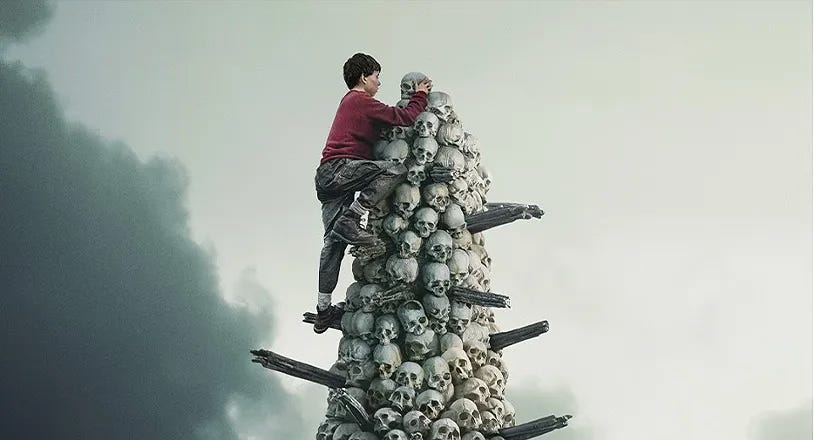28 Years Later
It would appear that Britain has proved it still has something to offer on the world stage of cinema with the long awaited sequel to the 28 Days Later franchise. The previous films in the franchise weren’t anything spectacular to follow up on and there wasn’t a great appetite for a continuation of these stories. However, another entry provided the chance to return to the decade of the 2000s which arguably was the last period when cinema was in a good place, especially for horror. 28 Years Later succeeds in reigniting an element of that nostalgia from its originality but also displaying creativity that is daring and refrains from feeling recycled.
Jumping into the film feels uninviting as we’re exposed to jarring cinematography and editing that is as disorientating as watching a Terry Gilliam film. But it’s a signature style that you soon get used to and it best thrives during a sequence when experimental filmmaking is thrown into the mix as archival footage from what appears to be either World War One or World War Two as well as the 1944 film adaptation of Henry V is intercut in between what’s taking place in the story world. It’s also during this sequence that the 1915 recording of American actor Taylor Holmes reading Rudyard Kipling’s poem “Boots” featured in the films trailer is intensified by the score from Scottish band, Young Fathers as we’re introduced to the current state of the infected 28 years after the virus began in haunting night vision that’s tainted red. This combination of ingredients creates a cinematic experience that commands your attention, especially in a mainstream work where this kind of bold filmmaking and freshness rarely makes an appearance.
While good, 28 Years Later doesn’t quite reach the ranks of excellence. The story is competent but there’s no reward for participating. It won’t provide you with anything meaningful nor do you feel emotionally attached to any of the characters. Other than its impressive technical aspects, the film’s strength lies in its strong sense of identity. It’s a film that uses its location as though it were its foundations. Set in North East England, the film adopts the regions accent, albeit sounding performative at times, and connects with its landmarks with the acknowledgement providing meaning to the story. It’s a film that feels British from a nation whose recent catalogue of cinema lacks embracement of a strong sense of identity. The ending suggests that the franchise is set to embrace the nations culture further as it sets up a sequel appearing to tread into provocative waters. 28 Years Later: The Bone Temple is due to be released in January 2026, and is expected to focus on the nature of evil. Although worldwide audiences may be left confused at the endings reference, I won’t spoil it for Brits, but the tease of what to expect from the sequel promises us something very intriguing.
28 Years Later is out in UK cinemas now
Absence
Subscribers to Aesthete Reviews may have noticed that I have not posted new content in almost two months. Unfortunately I found myself falling ill that led to me having to undergo emergency surgery and visiting A&E multiple times whilst experiencing extreme discomfort. During this period of illness I was not well enough to produce any content, leading to temporary abandonment of the publication. However, I’m glad to say after a recent unpleasant procedure and medication, I feel as though I am back to my normal self again. This means you can expect regular new content from Aesthete Reviews again as soon as next month.
What to expect
As well as reviews of new and upcoming releases, a new weekly newsletter will be introduced that focuses on the art of movie posters, more specifically the ones that provoke the imagination of the spectator turning them into storytellers within their own minds. It’s why movie posters are as important or sometimes more so than the film itself. More to come on that soon.
I’ve also been working on finishing a documentary featuring Author and journalist Lionel Shriver, Film critic Christian Toto, and Filmmaker & writer Chris Gore on how we may be witnessing the end of cinema being treated as a vehicle of activism as the world shifts away from identity politics and political correctness. That will be released on Aesthete Reviews in July. I look forward to sharing it with you all.


